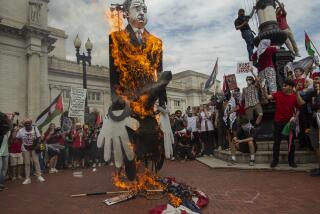Czechs Brace for World Banking Protests
- Share via
PRAGUE, Czech Republic — Organizers of protests aimed at the joint meeting of the International Monetary Fund and the World Bank here later this month say they want the demonstrations to be peaceful. But Prague authorities are gearing up for potential chaos.
“You simply cannot, in a nonviolent way, block the arrival of the cars, block the arrival of the delegates and interrupt the opening of the meeting,” said Lt. Col. Ladislav Briza of the Czech national police, who predicted that 20,000 protesters will show up. “There’s bound to be some contact--if not with the delegates, then with the police encircling the no-entry zone.”
Among the activists already in Prague is Hilary Keever, 24, an American who took part in the demonstrations against the World Trade Organization in Seattle last year. She’s working on the Web site of the protesters’ umbrella organization, INPEG (the Czech initials for the Initiative Against Economic Globalization).
Keever said she believes that the WTO, the IMF and the World Bank are catering to corporations and “are more interested in [poor] countries having export economies” than in “building up the country in a sustainable way.”
She said she hopes that the Prague protests will promote “a better world where there’s less division between rich and poor, and cancellation of debt for the poorest nations. We’re immensely interested in making sure people don’t die from starvation--basic things like this.”
Officials of these organizations vigorously dispute the charge that they fail to help the world’s poor, although they admit to some shortcomings in past policies and say they have already made appropriate changes.
Czech President Vaclav Havel, himself a former anti-Communist dissident, is seeking to bridge the gap between the protesters and their targets by inviting representatives of both sides to a panel discussion at Prague Castle on Sept. 23, three days before the start of the main IMF-World Bank meeting.
“President Havel’s primary aim is to create an atmosphere for a cultivated dialogue,” the presidential office said.
But the protesters’ plans--which are expected to include efforts to keep delegates from reaching their meeting hall Sept. 26 and stronger efforts to block them from getting out again--have triggered feverish preparations to cope with large-scale disruptions and potential violence.
Classes have been canceled for the week of Sept. 25, with parents urged to send their children out of town. Hospitals have been designated for protesters and police officers who might be injured. Special police training has included practice in how to cope with protesters throwing Molotov cocktails.
Police have imposed tough checks to keep potentially violent demonstrators out of the country.
More than 5,000 police officers and civilian police employees will be brought to the capital to supplement the city’s regular police force of about 6,100, Briza said. The army will provide 1,400 soldiers to reinforce regional police left understaffed by the transfers to Prague, and 200 soldiers will be in the capital to move heavy equipment such as trucks or blocking devices to reinforce a cordon around the delegates’ meeting hall, he said.
City authorities, concerned that masses of protesters might sleep in parks, have granted permission to a tent-manufacturing firm to run a camp for protesters at Prague’s huge Strahov sports arena, charging $36 per stay.
“We are preparing tents for 1,500 people, and the rest will be sleeping in their own tents,” said Tomas Doubek, 39, an employee of the company, who said he proposed the tent city partly as a way to promote dialogue rather than violent confrontation.
“We think there’s a great chance that if the people can eat and sleep in peace, they won’t be so nervous and irritable and will have a greater chance to express their opinions in a peaceful manner,” Doubek said.
More to Read
Sign up for Essential California
The most important California stories and recommendations in your inbox every morning.
You may occasionally receive promotional content from the Los Angeles Times.













